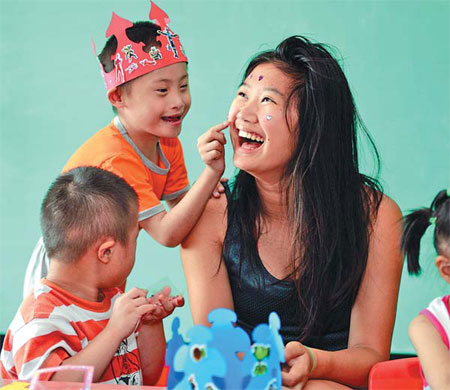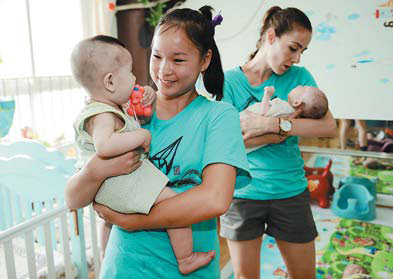US adoptees visit Chinese roots
Updated: 2013-06-27 06:47
By Cheng Yingqi in Beijing and Xiang Mingchao in Zhengzhou (China Daily)
|
||||||||
|
Mylie, 17, from North Dakota in the United States, plays with children at a welfare home in Zhengzhou, Henan province. She was one of 35 adopted Chinese-Americans who visited the welfare home on Monday and Tuesday during a trip to China to seek their backgrounds. Photos by Xiang Mingchao / China Daily |
|
Kenai, 18, from Colorado and Eli, 30, a counselor, with children at a welfare home in Zhengzhou. |
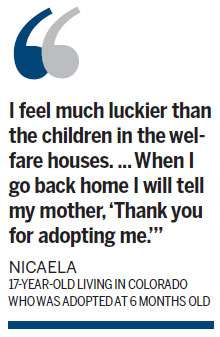
Youths volunteer at welfare centers, like those they lived in as children
Taozhu, 17, left a welfare center in Guizhou province at age 9 after she was adopted by a family of eight from the US state of Virginia. Many might see such a move as an adventure, yet the only emotions Taozhu felt were anger and fear.
"I was angry because I didn't understand why they took me away from the welfare center and into a world of white people, where I didn't even know how to communicate," she said.
Eight years later, when Taozhu again set foot on Chinese soil, she understood how lucky she was - she now has four sisters and two brothers - and she is thankful for her adoptive family.
She was among 34 Chinese children adopted by parents in the United States who traveled to Beijing, Xi'an and Zhengzhou to volunteer in welfare centers during a 10-day trip.
The youths, aged 15 to 20, learned to take care of abandoned 1-year-olds, and they played tag and made tie-dyed T-shirts with older children.
"The purpose of the trip to China is to teach about appreciation," said Zhong Hui, president of Chinese Children Adoption International, who took part in the tour. "These adopted youths are at the age when they are becoming independent and possibly rebellious, but by visiting the welfare centers, they can see how lucky they are to have their own home."
This was certainly true for Taozhu. "I still use the name I had at the welfare center. My parents tried to change it, but I am stubborn," she said. "I kept it because I want to keep my orphanage with me, because I never wanted to leave."
Yet her memories of those days were vague until she stopped in at the Zhengzhou Children's Welfare Institute in Henan province.
"I'd love to go back and visit," she said, referring to the center in Guizhou. "I don't think all of my friends have been adopted because some had disabilities. A lot of my friends, even though they were healthy, were also too old to be adopted.
"So some of them may be married, some may have gone away, and some may still be there," she said. "I'd love to go back and donate as much money as I can, or do as much as I can."
Nicaela, 17, who lives in the US state of Colorado and was 6 months old when she left China, said facilities at Chinese welfare centers are much better than she expected.
"Still, I feel much luckier than the children in the welfare houses because I have my own home," she said. "When I go back home, I will tell my mother, 'Thank you for adopting me.'"
A single mother adopted Nicaela from a welfare home in Chongqing and has another adopted daughter from Hunan.
"I'm living a happy life with my mom and sister, so I'm satisfied with life," Nicaela said, when asked whether she wishes for a father.
Few single parents outside China are able to adopt Chinese children. Since the number of families that apply is much higher than the number of orphans available, couples are preferred.
However, the restriction has been relaxed slightly in recent years in efforts to find better parents for youngsters with disabilities.
"I won't say there have been any major changes in China's international adoption policy, but we have made adjustments for single mothers depending on certain conditions," said Zhang Shifeng, director-general of the China Center for Children's Welfare and Adoption.
The center, backed by the Chinese government, is responsible for international adoption affairs such as receiving and delivering adoption documents and information, reviewing applicants' eligibility and matching Chinese children with foreign families.
"Some single parents, especially mothers, have proven they are more capable of taking care of older children (preschool age and older) or those with disabilities," Zhang said.
A recent trend at the centers is that the percentage of children with disabilities is increasing. For example, 98 percent of the children at Zhengzhou Children's Welfare Institution have some form of congenital disease.
"Chinese parents are changing. In the past, healthy girls were abandoned because parents preferred boys," said Guo Meng, director of administration at the China Center for Children's Welfare and Adoption. "Now most abandoned children have a congenital disease, regardless of gender."
A China News Service report recently cited statistics from the US Office of Children's Issues that US parents adopted 66,630 Chinese children between 1999 and 2011. Just more than 90 percent were girls.
"International adoption is an effective way to help orphans and disabled children return to family life," Guo said. "Most adopted children are well taken care of by the foreign families that adopt them, and most disabled children receive improved healthcare due to better medical facilities."
International adoptions in China started in the early 1980s, when foreigners working in the country adopted local children.
So far, China has established partnerships with 138 government departments in 17 nations and helped more than 100,000 orphans find new parents overseas.
Contact the writers at chengyingqi@chinadaily.com.cn and xiangmingchao@chinadaily.com.cn
(China Daily USA 06/27/2013 page1)

 Philippine, US start Naval exercise in S China Sea
Philippine, US start Naval exercise in S China Sea
 Supreme Court gay rights ruling celebrated across US
Supreme Court gay rights ruling celebrated across US
 Rudd returns as Australian PM after Gillard
Rudd returns as Australian PM after Gillard
 Brazil protests intensify before Confed Cup semifinal
Brazil protests intensify before Confed Cup semifinal
 Long lost weekend
Long lost weekend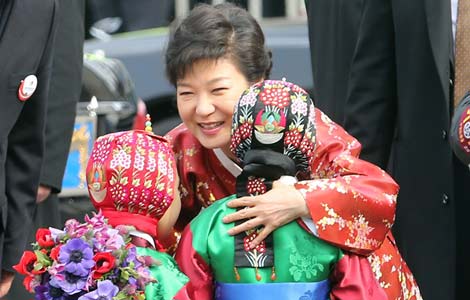
 Park ready to charm China
Park ready to charm China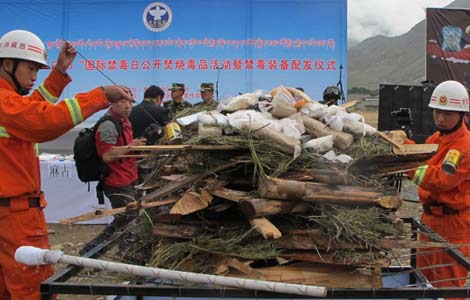
 Prices climb as police crack down
Prices climb as police crack down
 China 'most promising' in FDI
China 'most promising' in FDI
Most Viewed
Editor's Picks

|

|

|

|

|

|
Today's Top News
Promising outlook on US, China investment
US adoptees visit Chinese roots
Ecuador refutes Washington Post accusation
IBM to make Chinese job cuts
PBOC ends credit crunch, to go further
Snowden still at Moscow's airport, asylum pending
Mandela still critical, Zuma cancels trip
China slams Japan's new defense white paper
US Weekly

|

|
